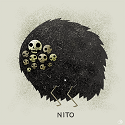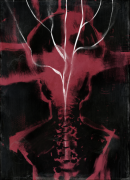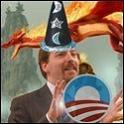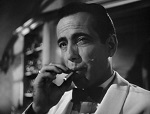|
SpacePig posted:Would you rather magic just work by random bullshit that people just happen to know how to do? If there's no set order of operations to magic, then it's just Calvinball. Exactly, I hate when a Magic Deus Ex Machina just pops up at the end because there are no inherit rules to the system that the author seems to follow.
|
|
|
|

|
| # ? May 11, 2024 08:38 |
|
The solution that authors throughout the ages have discovered is to have magic work on an intuitive level, limited by (somewhat obvious) logic. Gandalf can't burn snow, Mr. Norrell can bring back the dead for a terrible price, the gift of a skull lantern burns Vasilisa's wicked step-family to ashes. Magic has two intertwined purposes in fiction: the first is to expand the possibilities of what can happen in narrative, and the second is to represent liminal forces that overcome the familiar and the rational. Trying to categorise it ultimately devalues it, because the allure of magic is in that it is inexplicable. Knowing how a magic trick works ruins the enchantment, after all. Any system should be vague but understandable on an intuitive level, and serve an aesthetic purpose. The "system" in Vance's Dying Earth stories is a good example, because while magic still serves the purposes I suggested, spellcasting itself is ridiculous: there are about a hundred spells and they are all ridiculously specific, like entombing someone exactly forty-five miles under the earth. This reflects the world of the stories: the world is so broken that wizardry has become a series of strict rote actions. This system makes sense in an RPG, because you need a mechanic with predictable and measurable results, but in literature it should be used only to provide a very specific effect. e: That is to say, a satirical one. To bring this back to Kingkiller, the series's magic system is just an inferior version of the "system" in Jonathan Strange & Mr. Norrell. In that series, magic is an inexplicable force that can make anything possible, which academicians like Norrell try to control and Romantics like Strange embrace, until it spins out of their control and begins a new age of enchantment. You could call it a metaphor for the forces of human imagination liberated by the 19th Century. Kingkiller has a broadly similar same set-up, with academia such as Sympathy contrasted against wild forces like Naming and the Chandrian etc, but unlike Strange & Norrell this doesn't serve a larger story than, in the first book for example, Kvothe's coming-of-age into controlling wind (and being Such A Swell Guy). Rothfuss treats it as a given that this makes for a fascinating story, but it's ultimately shallow. BravestOfTheLamps fucked around with this message at 09:55 on Jan 27, 2016 |
|
|
|
Earwicker posted:I don't think there is anything wrong with having some sort of a system behind how magic works in a fictional world. But I think it is a problem when that it is a focus. The thing about this is that you need to tell me enough about brain surgery so that I can have a guess as to how he's going to use it in a situation and what the repercussions of that will be and so forth. Without that background it's just Calvinball and you can tell me that the problem was resolved by severing the connection between the hypermedula and Logowitz's body at the second cortical junction under the Wicket of Remorse and I just have to roll with that because I don't know any better.
|
|
|
|
That assumes it's being used to solve problems rather than to introduce them. Part of the point of magic is that it's beyond easy understanding and difficult to control, and in many cultures perhaps not worth trying to control at all, so resorting to it might cause as much trouble as its usage sought to prevent. Causing trouble is good because it raises stakes and stokes conflict. Sauron and the Ringwraiths being able to sense the Ring when people make use of it means Frodo must try not to use it when he can help it. The exact means by which Sauron is better able to sense the Ring when it is in use then when it's just sitting around is not rigorously explained in terms of any sort of system that governs Sauron's powers; the point is that the use of his own power draws his notice, and that's a bad thing, and one of the many reasons to avoid the temptation of power that the magical item represents and offers. It's like coincidence as a literary device: When coincidence helps the protagonist it's stupid, but when it hinders the protagonist it's fine. Accidentally bumping into the mob assassin who wants to kill you at Starbucks is a perfectly compelling way to send the plot off in an unexpected and exciting direction in a way accidentally bumping into the one person who can resolve the protagonist's problem at Starbucks isn't, even though the plausible odds of that coincidence actually happening are probably low. To go back to the brain surgery example, you're right if the plot turns on a particularly important surgery. But not if the main character accidentally has a patient die during surgery and the medical director is convinced it's because he made a mistake. We don't necessarily need to know what the alleged mistake was, beyond maybe an offhand comment about some procedure the director accuses him of botching. We don't need to be told what that procedure entails if the core of the conflict is "I'm a brain surgeon and everyone thinks I hosed up, but as far as I can tell I didn't." You can gloss over most of the specifics if they're not relevant and just say something like "Dr. Soandso walked himself through his surgery over and over, so clear on each step that it seemed quite impossible that any of them could have been forgotten." We'll take his word for it (or suspect he did in fact gently caress up; where he hosed up doesn't matter unless that puzzle was made part of the story).
|
|
|
|
I had an epiphany today. The "fae" is really the internet. That whole section is Kvothe discovering the internet. That whole Felurian bit was really a sex cam, where Kvothe spends all of his hard-earned cash. No wonder he's so poor and always talking about money. Cthae or whatever is our young Kvothe's first troll. That amazing cape thing he gets is a purchase from Amazon. "I don't know how long I was there, there was no passings of days, I don't remember what I ate (Doritos)" or whatever...it all makes so much sense now.
|
|
|
|
Flattened Spoon posted:I had an epiphany today. The "fae" is really the internet. That whole section is Kvothe discovering the internet. That whole Felurian bit was really a sex cam, where Kvothe spends all of his hard-earned cash. No wonder he's so poor and always talking about money. Cthae or whatever is our young Kvothe's first troll. That amazing cape thing he gets is a purchase from Amazon. "I don't know how long I was there, there was no passings of days, I don't remember what I ate (Doritos)" or whatever...it all makes so much sense now. I hope the fae are the internet because it's the only place Kvothe will ever fit in.
|
|
|
|
Nakar posted:That assumes it's being used to solve problems rather than to introduce them. Part of the point of magic is that it's beyond easy understanding and difficult to control, and in many cultures perhaps not worth trying to control at all, so resorting to it might cause as much trouble as its usage sought to prevent. Causing trouble is good because it raises stakes and stokes conflict. Sauron and the Ringwraiths being able to sense the Ring when people make use of it means Frodo must try not to use it when he can help it. The exact means by which Sauron is better able to sense the Ring when it is in use then when it's just sitting around is not rigorously explained in terms of any sort of system that governs Sauron's powers; the point is that the use of his own power draws his notice, and that's a bad thing, and one of the many reasons to avoid the temptation of power that the magical item represents and offers. I don't like Brandon Sanderson's books but I like this essay he wrote on magic as a narrative device in literature. It's pretty much a generalisation of what you're saying: The more that you can explain an understand a "magic system", the more likely it is to be used by the protagonists to solve problems, rather than being the source of those problems. He talks about this division between "hard magic" (like his and Rothfuss's systems, arguably something like Harry Potter) and "soft magic" (where it's much more handwavey and bullshit, like in Lord of the Rings or Joe Abercrombie/Scott Lynch's stuff). I much prefer the latter, because it's a mysterious plot device that regular people have to deal with and put up with, rather than the former, where it's a set of tools that the reader appreciates being combined in some innovative way. Some people prefer that, and that's fine I guess. It's nice to operationalise the difference between the two concepts, I think.
|
|
|
|
Lol he named narrative laws after himself.
|
|
|
|
Boing posted:I don't like Brandon Sanderson's books but I like this essay he wrote on magic as a narrative device in literature. It's pretty much a generalisation of what you're saying: The more that you can explain an understand a "magic system", the more likely it is to be used by the protagonists to solve problems, rather than being the source of those problems. He talks about this division between "hard magic" (like his and Rothfuss's systems, arguably something like Harry Potter) and "soft magic" (where it's much more handwavey and bullshit, like in Lord of the Rings or Joe Abercrombie/Scott Lynch's stuff). I much prefer the latter, because it's a mysterious plot device that regular people have to deal with and put up with, rather than the former, where it's a set of tools that the reader appreciates being combined in some innovative way. Some people prefer that, and that's fine I guess. It's nice to operationalise the difference between the two concepts, I think. That makes a great deal of sense. Since I was a science-fiction fan first, I usually prefer the magic in my fantasy structured like advanced tech in SF. Other like the mysterious aspect more, and don't enjoy the structured magic systems. It's just a preference.
|
|
|
|
BravestOfTheLamps posted:Lol he named narrative laws after himself. Well his books certainly weren't going to immortalize him.
|
|
|
|
Benson Cunningham posted:Well his books certainly weren't going to immortalize him. Ka-BOOOOOOM!
|
|
|
|
Benson Cunningham posted:Well his books certainly weren't going to immortalize him. That essay by the way rather handily explains why "hard magic" tends to be so insipid: it's comic book superpowers. And superpowers are only ever as interesting as the story they're used to tell. In Kingkiller, magic is more or less an extension of Kvothe's own legendry: when he has it, he's cool and expectional, and when he doesn't have it there's something wrong. This also gets to the thematic and narrative problems of the whole whole legendry around which the story revolves. SImply put, it's way too self-referential and lacking in cohesion or greater importance. There was this silly clickbaitish style article listing all the reasons Kingkiller would make a great TV series, and one of them is that Kvothe embodies several fantasy archetypes at once (thief, bard, wizard, warrior, etc). But this is actually muddles the whole story. Kvothe is supposed to be a living legend, but what legend does he actually embody? If the series is about the hard reality behind the mythic structure of stories, what exactly is that mythic structure? The only concrete element in the legendry is that Kvothe is exceptional. but even if Kvothe is an unreliable narrator and it's all bullshit, we are still left with the conclusion that Kvothe is an exceptional person around whom the narrative world revolves (as confirmed by the third person chapters). I said earlier that Umberto Eco's Baudolino did everything Kingkiller tries to do, but a hundred times better. Hopefully some people took up my recommendation and read the book, and noticed how strangely it both follows and defies the plot of Kingkiller. Baudolino is an Italian peasant polyglot who is by chance adopted and raised by Emperor Frederick Barbarossa. He ends up, among other things, bringing the bodies of the Magi to Cologne, creating the legend of the Holy Grail, and starting the Third Crusade. But despite being the most important person in the world, Baudolino ends up being a historical non-entity, outlived by the myths he supposedly created. Even his name belongs to someone else, an 8th century saint. While never explicitly stated, there is an explanation for why this happens: Baudolino simply does not fit into the medieval imagination. He is a rogue but not a scoundrel, a scholar but not a holy man, a warrior but not a knight, a leader but not a king. He's a philosophical pseudo-picaresque adventurer, and thus out of place in the Medieval legendry. Kingkiller conversely suffers from that Kvothe is illogically a living legend even though he fits no myth. Is he sorcerer of legend? Is he an adventurous warrior? Is he a political assassin? He's the subjects of contradictory of myths, but even contradictory myths should have some core to them. The myth of Kvothe the Kingkiller is ultimately that he is exceptional, and is thus worthy of stories. The problem is that this is a misunderstanding of myth and story: reality does not inspire myth, myth actually precedes reality. We only get fragments of what kind of figure Kvothe is supposed to be, but this is not tantalising hints but obvious attempts at maintaining tension. This ends up hamstringing the story in favour of serialisation. The Chandrian serve as a perfect metaphor for Kvothe's non-myth: they're remarkable because they're the subject of myths, not because they're an interesting myth. The whole premise of the story is broken: how do we enjoy seeing behind the legend when there is no real legend? The answer is that this anti-myth of Kvothe is actually the series' greatest strength, even if it's also its ultimate failure. The attraction of the story is in that we want to know what makes Kvothe so special. He's a blank canvas onto which to project other stories. This is why he's so all-encompassing, but also so hollow. Goons seem to have articulated this in a different way already. I believe that this type of character is also known as a "Mary Sue". You know, this post was originally just about how the magic in Kingkiller is thematically dull. BravestOfTheLamps fucked around with this message at 16:22 on Feb 1, 2016 |
|
|
|
Hey, if it ends up with more people reading Baudolino, that's by no means a bad thing.
|
|
|
|
|
I picked up Baudolino because of this thread. I'm not far into it (chapter 6) but I love the fact that he's not the center of the universe in his own story and most of what he has accomplished so far was just dumb luck - saying the right thing at the right time and whatnot. I wish I had gotten it before the holiday madness. I haven't really a lot of time to sit down and read it.
|
|
|
|
Let's just make this thread about other books? Core of this thread died years ago. Rothfuss has been discussed hundreds of times. Always same arguments. But it's a wizard book written by someone who's influenced by videogames, why would anyone expect a series that's actually good? But it's entertaining (and will never be finished), that's what matters. Rothfuss blog on the other hand is total bs, I don't even want to know what happens there anymore
mallamp fucked around with this message at 08:13 on Dec 21, 2015 |
|
|
|
It's only through other books that we will find out how really bad Kingkiller is. I'm rereading Name of the Wind and feel more and more confident in my conclusion that strictly realistic prose is the worst possible mode of writing for fantasy. e: quote:“Imagine my relief,” Kote said sarcastically.  I guess I take back Rothfuss being a decent writer when he sticks to realistic stuff I guess I take back Rothfuss being a decent writer when he sticks to realistic stuff
BravestOfTheLamps fucked around with this message at 09:22 on Dec 21, 2015 |
|
|
|
mallamp posted:Let's just make this thread about other books? Core of this thread died years ago. Rothfuss has been discussed hundreds of times. Robin Hobb's Assassins Apprentice is really quite good (with some personal gripes from me here and there) and sets out almost like what Kingkiller tries to do but in a more complete and better way. Never got around to reading the subsequent trilogies from her though.
|
|
|
|
Xaris posted:Robin Hobb's Assassins Apprentice is really quite good (with some personal gripes from me here and there) and sets out almost like what Kingkiller tries to do but in a more complete and better way. Never got around to reading the subsequent trilogies from her though. Liveship Traders is good after the first 50-100 pages (which were nearly unbearable to me), Tawny Man is alright, and Rain Wilds is decent but has a slow start like the Liveship books.
|
|
|
|
Rain Wilds was two decent books inflated to four mediocre ones.
|
|
|
|
I've never liked Dickens much, but Great Expectations does everything better than Rothfuss or Hobb.
|
|
|
|
BravestOfTheLamps posted:I've never liked Dickens much, but Great Expectations does everything better than Rothfuss or Hobb. BUT DOES IT HAVE ELVES?! The Book of the New Sun by Gene Wolfe is what everyone here should go read if they haven't already. Or even if they have. It shares some common elements (study of myths, unreliable narrator), but is in every way a better and deeper series. It is my favorite book series ever. Please go read it.
|
|
|
|
Benson Cunningham posted:BUT DOES IT HAVE ELVES?! I read the first book and just started the second (sword and citadel) just because I want to finish it. But the first is rather odd. It alludes to a lot of weird magic stuff but there's rarely any interaction it seems. And very little is explained. Not quite what I expected when people, who have similar tastes as I, suggested it. Does more happen/get explained in the second book?
|
|
|
|
Uh, most of what gets explained gets explained on your second read.
|
|
|
|
|
What I especially like about New Sun (and most of Wolfe) is that it's perfectly content to be clever without bragging about it. I remember audibly groaning at the part where Rothfuss said something along the lines of, "I could tell you about the pirate adventures and all the action that happened, but that would detract from the main story." Hooray, you're subverting tropes by telling me about the things you're not telling me about. I also remember when I realized that the active narrator of a Wolfe series died half a book ago. Holy Scandinavian Christ! The difference being, Rothfuss told me that he was being clever. Wolfe gave me the opportunity to be clever. Fake Edit: Wolfe does take some time to digest, though. Enjoy the dreamy pose and melancholy on the first read through, have an epiphany on the crapper about a week later, then dive back in for an increasingly rewarding and surprisingly different experience.
|
|
|
|
I had a pretty hard time with New Sun. I felt like I got lost a lot.
|
|
|
|
mallamp posted:Let's just make this thread about other books? Core of this thread died years ago. Rothfuss has been discussed hundreds of times. Always same arguments. But it's a wizard book written by someone who's influenced by videogames, why would anyone expect a series that's actually good? But it's entertaining (and will never be finished), that's what matters. Rothfuss blog on the other hand is total bs, I don't even want to know what happens there anymore Why would this place need yet another general thread for fantasy stuff
|
|
|
|
crestfallen posted:I had a pretty hard time with New Sun. I felt like I got lost a lot. It's not an easy book, for sure. The first time I read it I don't think I understood more than 40% of what was going on. That actually compelled me to research the book more, pay more attention, and try to read critically. I never actually took notes while reading, but this is a book I would take to a quiet place and leave my phone off to read. The depth and breadth of the story is really impressive. The way the pieces fit together, the way time works in the novel, the unreliable narration Severian does, and the fact he comes into ownership of other's memories throughout the book makes for a really neat story. There is some really imaginative stuff in the setting as well. Basically my take is this - Book of the New Sun is good because as you read more critically, you gain more and more from the story. If you try to do the same thing with NoTW and WMF, the quality just keeps going down. TL;DR - Book of the New Sun is literature. Benson Cunningham fucked around with this message at 21:07 on Dec 21, 2015 |
|
|
|
crestfallen posted:I had a pretty hard time with New Sun. I felt like I got lost a lot. I think this is me right now. I made sense of Malazan first read through and people seem to find that confusing. This is just another level it seems.
|
|
|
|
I Own Soulz posted:I think this is me right now. One of my favorites things about the book is that a majority of it is spelled out for you even in the first read through- the issue is the main character has an eidetic memory. He only ever feels the need really to explain something once, maybe even just in one sentence, and assumes you will remember. There are tons of details like that. God drat Book of the New Sun is so good.
|
|
|
|
Benson Cunningham posted:BUT DOES IT HAVE ELVES?! I read Shadow of the Torturer over a two day period and I felt lost. I picked up the second one expecting it to start where the first one had ended because it would seem that way from the ending of the first one. I'm also confused about the setting: there are guns and I think when the narrator and the woman were in the building with all the different rooms, they saw an airplane from the past? so is this some kind of future where everything had gone to poo poo and now there is only the Citadel? I haven't started to read the second book as I only got a few pages in, but I'll have to give it another try.
|
|
|
|
I guess you missed the ancient picture he saw in the citadel of a knight with a dome helmet holding a banner on a gray desert, i.e. the first moon landing. The moon that is now green and planted with crops or forests. It's Earth so far in the future the sun is dimming. Later books give some hints of past colonization and technical cycles, but they are droplets from an ocean of time. The Slithery D fucked around with this message at 14:19 on Dec 22, 2015 |
|
|
|
|
What Slithery D said, but also time travel is frequent in the series. Watch out for that.
|
|
|
|
It's inspired by The Dying Earth, so that's not meant to be a spoiler or anything. It's very deliberate and the dying sun is part of the major thematic element of the books (which is partially given away by the series title, and partially by Gene Wolfe being Catholic). Part of what makes the book work so well (but also be confusing) is that Severian is a product of his society and as such accepts as normal things his reader has no reason to understand. Choosing to use archaic words to convey this means you can derive the meaning not just from context (as you would in any fantasy that uses its own terminology) but from the meaning of the archaic word itself. An armiger is a noble soldier; Severian doesn't explain this, but the social class he refers to as armigers more or less fit this role from context. Where Wolfe can trip you is using a word you think you know; for example, Severian makes no distinction between sailors of the seas and rivers and sailors on starships, which he refers to using identical terminology (starships even have "sails"). This makes perfect sense for a society where space travel has long been (or once was) considered as commonplace as water travel, and so Severian has no reason to distinguish a sailor and an astronaut. Likewise your note on guns: Pistols are energy weapons, and fusil - an archaic name for guns - appears to be used to describe explosive energy weapons; people don't make guns anymore and don't use ballistic weapons, so a raygun is just a pistol because as far as Severian knows that's the only kind of pistol. Also Wolfe already has a thread so this could probably go there.
|
|
|
|
Nakar posted:
The goal is to help people who have been hurt by Patrick Rothfuss. This is a healing thread now.
|
|
|
|
loving gofdawful poo poo wroiterm I wa psromised a revolution but instead I got a da,[p fart
|
|
|
|
there has been no FINANCAILLY SUCCESSFUL POPULAR gorundbreaking fantasy since probably china mieville's first bioks .loving nerds odn't evne know what groujndbreaking is. fuc
|
|
|
|
stagnant poo poo genre
|
|
|
|
bad bsd bad hopeless
|
|
|
|
a tart of turds
|
|
|
|

|
| # ? May 11, 2024 08:38 |
|
Avshalom posted:a tart of turds
|
|
|




























